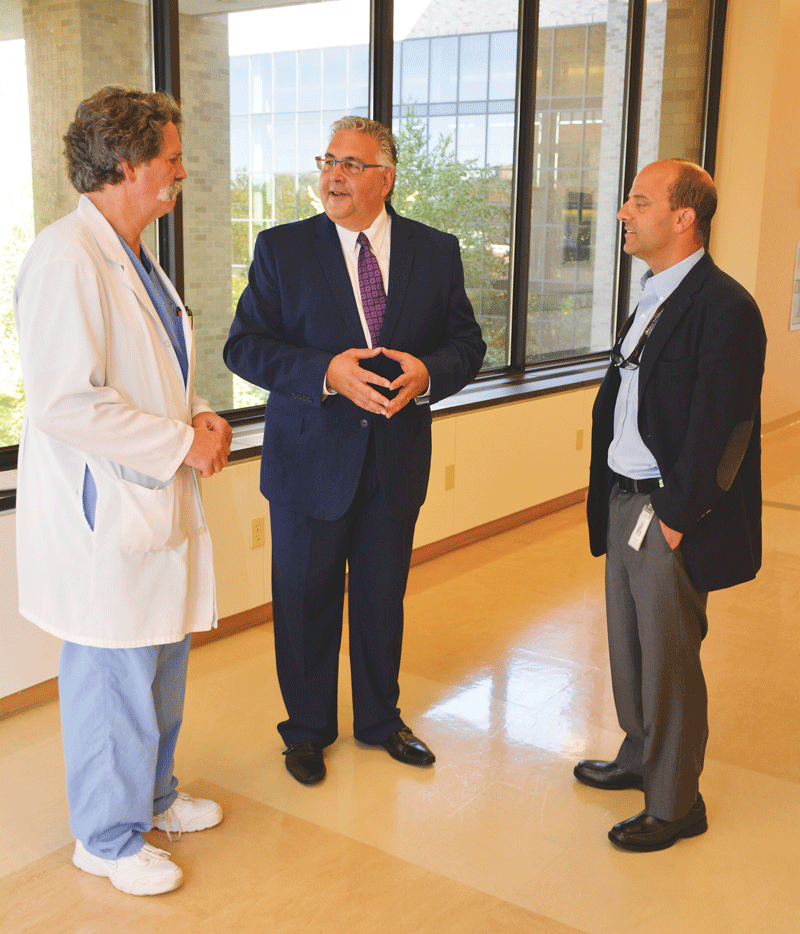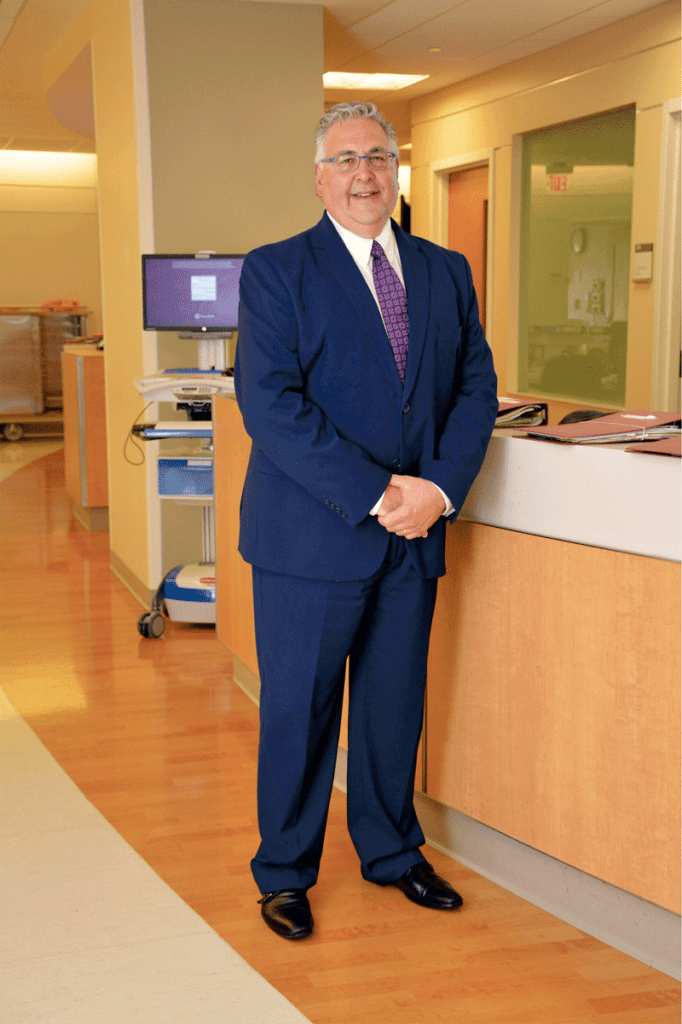Mission Control
Mark Fulco Takes the Reins at Mercy Medical Center
By George O’Brien
Mark Fulco called it the “president track.”
Formally, he was carrying out a role within the Livonia, Mich.-based Trinity Health system, specifically that of ‘vice president, Health Ministries & System Office Communications Interface.’ While doing that, though, he was learning and essentially being groomed for a leadership position in one of the system’s many hospitals and medical centers.
“The idea behind this role was to bring in what they considered a high-potential executive for advancement to come here, work for the system office, learn some new things about how the system worked, and help set the operating model and the agenda for some of what the organization was going to do moving forward,” he explained, “and then return back to the regional help ministries at a level higher than they left the field at.”
He called it providential — a word he chose very carefully because of the significant meaning it carries — that the later stages of his 18- to 24-month tenure on this president track coincided with a presidential search at his former place of employment, Mercy Medical Center in Springfield, part of the Sisters of Providence Health System.

He became a candidate and prevailed in what became a nationwide search. Thus, he’s essentially coming home, as he put it, to a hospital and a system with a somewhat unique mission, one he came to fully appreciate during his tenure there, which included work in everything from fund development to marketing; new-business development to operations of the accountable-care organization and clinically integrated network.
Fulco said the Mercy presidency was essentially the first job at that level that he applied for, and it’s one he sought enthusiastically, because of what he experienced there and was part of.
“In this role [at Trinity], I’ve had the opportunity to see how healthcare is delivered across the country,” he told HCN. “And from that, I can say that the people of Western Mass. are really lucky to have such a talented and caring team at Mercy. And this is what really called me back to Springfield.
“It’s a great community,” he went on, referring to the Greater Springfield area. “But the real driving factor for me was the Mercy team; I’ve seen 94 or 95 different hospitals in our system, and I’ve met great caregivers from across the country, but Mercy has among the best I’ve seen, and the legacy of the Sisters of Providence … that’s a calling, it’s an honor, and it’s also a big responsibility to carry on that healing legacy.”
Fulco returns to Mercy at what he acknowledged was an ultra-challenging — and uncertain — time for the hospital, the system, and seemingly every healthcare provider in the country, with the uncertainty coming in many forms but especially the unknown fate of the Affordable Care Act, a.k.a. Obamacare.
Fulco said all providers are operating in an environment where reimbursements from most payers, and especially Medicare and Medicaid, do not fully cover the cost of providing care. This is not a recent phenomenon, but the situation has grown steadily more precarious in recent years.
In response, systems and individual providers must become ever-more efficient, he said, and, in a word, they must innovate.
To do to that effectively, he said he intends to take full advantage of the know-how, resources, and, yes, buying power of the Trinity Health system and its New England region. As an example, he cited a project that is in some respects already underway — conversion to a new electric medical record (EMR) system known as EPIC.
“This is something Mercy would not be able to do on its own,” he said of the EMR conversion. “If we weren’t able to rely on our colleagues in the region, this is something we couldn’t afford to do, and that’s just one example of taking full advantage of our regional resources.”
For this issue, HCN talked with Fulco just days before his formal return to Springfield about his new role and that big responsibility he accepted to carry on the work of the Sisters of Providence.
Back to the Future
It’s not listed on his résumé, but Fulco still considers it one of his more important career stops.
He was referring to his time as an advanced-life-support EMT roughly 30 years ago, while he was in graduate school.
“That was my first job in healthcare,” he recalled, adding that, like all those that followed and especially his most recent assignment in Michigan, it was quite a learning experience. “That time as an EMT gave me some unique experience as a caregiver, and it gave me an appreciation for the clinical side of healthcare and incredible respect for physicians and nurses and the work they do.”
Over the next three decades, Fulco would move off the front lines in healthcare and take a series of management positions, with each one bringing new and different responsibilities.
After a stint as president of Masonic Management Services Corp. in Wallingford, Conn., a nonprofit affiliate of Masonicare, he became senior vice president of Cardium Health Services in Simsbury, Conn. From there, he took the role of vice president of Strategic Marketing and Business Development at Saint Francis Care in Hartford, another member of the Trinity Health system.
In 2005, he took the position of ‘chief transformation officer’ for the Sisters of Providence Health System. This was a broad role with a host of responsibilities that included strategy formation, accountable-care organization and clinically integrated network operations, and business-development activities, including marketing, communications, and fund development.
And as transformation officer, he helped oversee a good deal of, well, transformation in many areas, including formation and operation of an accountable-care organization, one of many areas where Mercy was out front and in many ways ahead of other providers within the Trinity Health system.
It was roughly 21 months ago that he joined Trinity Health in that aforementioned ‘interface’ role, and he described his time in Michigan as invaluable when it comes to meeting the challenges he will face as he leads Mercy Medical Center.
But as much as he enjoyed working behind the scenes, if you will, he was anxious to get back to a hospital setting.
“Healthcare is not necessarily delivered in the boardroom,” he told HCN. “Here in Michigan, I have an opportunity to see how the large healthcare system boardroom works, and how the large healthcare system team works in support of what’s delivered at the local level. But care is delivered at the bedside, and while this work here at the system office was exciting and invigorating, and it was wonderful to work with some of the best and brightest in healthcare, the hospital is where hope and healing occurs, and I wanted to be part of that again.”
He said he will bring to that role a management style grounded in the fundamentals of servant leadership, something he says comes to him naturally, because it has been his style throughout his career. And it’s also something that fits nicely with the missions of SPHS and Trinity.
“It dovetails with being a people-centered healthcare organization,” he explained. “And a lot of this was my upbringing — my father was a career public servant, and I was taught to be of service to others. It’s ingrained in me; it’s part of my DNA.”
Bringing it Home
As he talked some more about what made a return to Mercy so attractive to him, Fulco got his message across by relating the reactions he got from others when he would talk about the system.
“People here [in Michigan] are impressed when they hear about what the sisters have done, how they’ve served that community, and what that legacy is,” he explained. “But it’s interesting … they also tell me that me that, when I talked about the Sisters of Providence Health System and Mercy Medical Center, I had a twinkle in my eye that told them there was something special there. And I told them that you couldn’t help but have that if you spent any amount of time within that organization.”
Fulco will now get to spend considerably more time within that system, and he is already compiling a to-do list of sorts, or what he called a game plan for his first 100 days, one that came together through input gathered during the interviewing process, discussions with Interim President Beth O’Brien, and his decade of experience in the system.
And at or near the top of that list is doing a better job of telling Mercy’s story, he told HCN.
“When I look at the challenges at Mercy, I think the care provided there is one of the best-kept secrets in Western Massachusetts,” he explained, adding that no business or organization, especially a hospital, needs or wants that particular quality, if that’s what a best-kept secret is.
“It’s been the organization’s culture to serve and be humble — that’s how the sisters taught us to be,” he went on. “But I think the community needs a better understanding of the physicians, the nurses, and the comprehensive services that are provided at Mercy and through the Mercy network.”
As he goes about working with those providers to better communicate Mercy’s services and mission, Fulco said he will put a heightened focus system-wide on the need to innovate, especially amid reimbursements that do not cover the full costs of providing care.
“Anyone who manages a household budget knows that you can’t spend more than you earn,” said Fulco. “So Mercy and Trinity Health New England are continuing to innovate with some of these approaches to deliver the absolute best and highest-quality care, but also deliver that care at the highest possible efficiency.
“We don’t know what’s going to happen with the Affordable Care Act,” he said. “But no matter where it goes, we’ll need to continue providing the very best care we can for people, and it needs to be done in a more efficient way at a lower cost year over year.”
There will be several initiatives in this broad realm, and some are already underway, he said, putting the EMR project in this category.
Improved EMR makes a system more efficient, he explained, because it allows for improved communication between providers across the region, giving physicians and nurses immediate access to information, an ability that often eliminates redundancies and mistakes in treatment, thus enabling Mercy, and the healthcare system as a whole, to reduce costs.
“When a test is done, other specialists don’t necessarily have to redo that test, so we’re able to save the system and, ultimately, all of us, as the payers for care, quite a bit of money,” he explained. “If a lab test is done, another physician isn’t redoing that lab test; when an X-ray is done or an MRI, you don’t necessarily have to redo that.”
Putting in the new EMR system is a massive undertaking with a lot of moving parts, said Fulco, adding that such enhancements have been undertaken at several facilities under the Trinity umbrella, and he intends to take full advantage of this accumulated wealth of knowledge and experience.
“We have a great team on the ground both at Hartford that has had experience implementing these systems, and the incredible team at Mercy that will help with the heavy lifting done,” he said. “It will be a process, and a big process, for us to undertake, but we’ll do that and make sure nothing falls through the cracks.
“One of the best things about being part of a system like this is that we’ve done this several times before,” he went on. “And with each one, you do you learn some things; we can now avoid the bumps in the road that others have encountered.”
Mission: Statement
‘Providential.’
That adjective, which Webster defines, variously, as ‘destined,’ ‘divine,’ and even ‘preordained,’ certainly works when Mark Fulco talks about coming home and all that goes with that territory.
He told HCN that carrying on the work of the Sisters of Providence is an honor, but also a very big responsibility. It is all of that and more.
But it’s an assignment he’s looking forward to — as much as he is having still more people recognize that twinkle in his eye when he talks about not just where he works, but where he carries out the sisters’ mission. v
George O’Brien can be reached at
obrien@businesswest.com





Comments are closed.